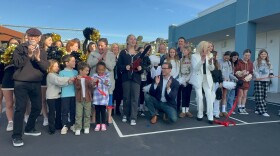Even before news got out about the devastating 8.9 magnitude earthquake and resulting tsunami that have devastated Northern Japan, Mayu Boomer knew something big had happened.
She was in the middle of her nightly Skype conversation with her parents when their home near Tokyo began to shake.
“Earthquakes are pretty common so I wasn’t afraid at the beginning,” said Boomer, standing Friday outside of Kearny Mesa’s Mitsuwa Marketplace. “But then it kept on moving and shaking so badly. Then my dad was holding the cabinet and the TV even fell on the ground and my mom was hysterical. I didn’t know what to do and I was watching the whole thing live.”
Even though she watched her parents safely ride out the earthquake and subsequent aftershocks, Boomer was still feeling shaken Friday.
“You feel so helpless, because you’re so far away,” she said.
Once news reports about the earthquake and tsunami began, other San Diegans relied on Skype and email to reach their friends and family early Friday morning.
“I had a hard night sleeping,” said Yukari Clough. “I was trying to call my mom, but the phones were so busy I couldn’t get through.”
Once Clough learned her own mother was safe, she said she felt relieved but sad.
“I feel so sorry for everybody in the northern part of Japan,” she said.
Sendai, Japan was the closest city to the epicenter of that country’s most powerful earthquake on record. It has also been inundated by water from the 30-foot tsunami wave.
“It was very shocking,” Kuni Toda said about video showing water surging into Sendai. Toda said he was once a journalist in the city.
“When I worked there, 20 years ago, there was a very big earthquake. At that time – 26 people died. But this time, I don’t know how many people died, maybe more than 1,000.”
Toda saw television footage of an oil refinery fire in Chiba prefecture, where his family lives, and emailed a relative.
“She sent back that everybody’s OK, so I was relieved to hear that,” he said.
Japanese language instructors in San Diego public schools took time out of class on Friday to talk about the destruction in their home country.
Toshiko Hasegawa teaches Japanese to about 30 teenagers at Morse High School in Southeast San Diego.
She was born in Japan, and her brothers and sisters still live there in southern Tokyo.
Hasegawa has childhood memories of ducking under tables because of frequent temblors, but she quickly realized this one was different.
She tuned into Japanese TV when she first heard of the massive earthquake.
Hasegawa’s students were just as concerned when they saw her the next day in class.
“First thing before the classroom greeting they said ‘Tsunami! Are you OK? Is your family OK?,’” Hasegawa said. “They were thinking of my family, my brothers and sisters.”
Hasegawa’s family experienced the quake but no one was injured. She said her students took a moment of silence before class for the victims in her homeland.
Helen Lebowitz, who lives in University Towne Center, said her son teaches English outside of Tokyo, where he lives with his Japanese wife and two children.
Lebowitz was watching television last night when she got first word of the earthquake. She tried to call her son immediately, but couldn't get through.
"Even though I was up a couple of times during the night, both to watch television to see what was going on, and also to place the calls again. I kept getting busy signals. At six o'clock in the morning, the phone rang and it was my son and he said they were fine."








